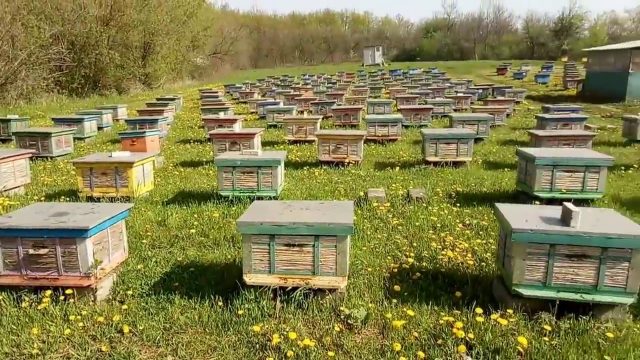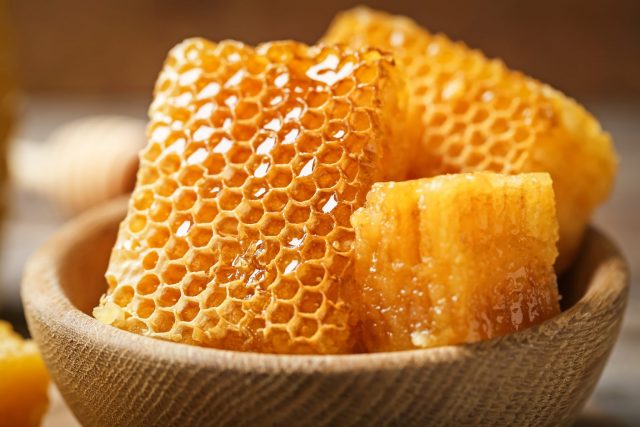Content
- 1 The state of industrial beekeeping today
- 2 Professional beekeeping: prospects for the development of the industry
- 3 Goals and objectives of industrial beekeeping
- 4 What are the advantages of professional beekeeping
- 5 Conditions for the organization of an industrial apiary
- 6 Equipment for an industrial apiary
- 7 Location and dimensions of an industrial apiary
- 8 Working staff
- 9 Potential risks
- 10 Conclusion
In addition to amateur breeding of bees, there is also the technology of industrial beekeeping. Thanks to production technologies, it becomes possible to receive much more finished products from one apiary, while the work does not require a lot of labor.
Despite the fact that this type of business on the territory of Russia is not fully developed professionally, start-up entrepreneurs have prospects to occupy their niche and enter the world market. Professional domestic beekeeping in large-scale production will make it possible to supply finished products not only within the country, but also far beyond its borders.
The state of industrial beekeeping today
Today, there is industrial beekeeping in Russia, but, unfortunately, it is not export-oriented. The target audience is still the domestic market. Despite the fact that in Russia there are all the conditions for professional breeding of bees and obtaining finished products of high quality, this system is rather poorly developed. At the moment, the available reserves are used poorly and not to the full. That is why other countries easily bypass Russia for the production of honey on an industrial scale.
Professional beekeeping: prospects for the development of the industry
If you professionally maintain an apiary, then there is every chance to enter the world market. Annually, about 50,000 tons of honey are mined in Russia, as a result of which the country surpasses even Austria in terms of the number of products received.
If we focus on the domestic market, honey is very popular and in demand. If you organize everything professionally and make the apiary really large-scale, then you can easily export products. In this case, it is important to do everything correctly: to register as an individual entrepreneur or LLC, to approach the conduct of business as responsibly and professionally as possible.
Goals and objectives of industrial beekeeping
Each production, regardless of its scale, has goals and objectives, professional beekeeping in this case is no exception. The main goal of any beekeeper is to obtain and further sell honey and related products.
To conduct a full-fledged activity, you will need to equip an apiary in accordance with all the rules, purchase bees, thanks to which it will be possible to produce products in large quantities and sell after the end of honey collection.
The main tasks in this case are:
- technical support of the apiary;
- selection of bees;
- further maintenance of bee colonies in conditions suitable for them;
- search for channels for the sale of finished products.
What are the advantages of professional beekeeping
Professional production has a number of advantages, among which are:
- receiving additional income if you combine several types of activities at the same time, since beekeeping is a seasonal business;
- self-obtaining honey allows you to reduce the cost of finished products;
- for the period of honey collection, you can conclude an agreement for the lease of agricultural land, as a result of which the bees will not only collect nectar, but also pollinate the plants;
- if you adhere to a certain technology, then you can make almost all work automated;
- if necessary, you can increase the size of the apiary using your own bees.
If you approach the matter responsibly, then there will be an opportunity to receive a good income.
Conditions for the organization of an industrial apiary
When planning to engage in professional entrepreneurial activity and open your own apiary in large-scale production, it is important to understand that this business is seasonal. This is due to the fact that the maximum collection of honey is carried out by bees from April to August.
As a rule, many jobs are automated, but it is recommended to hire employees for auxiliary and mechanical activities. If all processes in the apiary are mechanical, then a minimum of people will be required to run the farm.
In order for the professional type of activity for the maintenance of the apiary to function normally, you will need:
- install equipment that will be used to pump out honey, process secondary raw materials, for example, wax;
- a suitable bee species must be selected for a specific region;
- it is important to change the queen bee in a timely manner;
- find reliable suppliers who will provide feed and materials necessary for work;
- high-quality care of bees will allow you to get high quality products.
In order for this type of business to be not only professional, but also legal, it is worth going through the registration process as an individual entrepreneur or LLC.
Equipment for an industrial apiary
When it comes to large-scale production, industrial beekeeping equipment should resemble a conveyor type of work. In this case, it is not recommended to use amateur technology. As professional equipment for arranging an apiary on an industrial scale, mechanisms will be required that allow:
- build up frames and hardware;
- print honeycomb frames;
- collect pollen, bee bread, propolis, royal jelly;
- pump out honey;
- recycle wax;
- to produce foundation.
For other types of work, as a rule, employees are hired. In most cases, 1 person can serve about 1000 hives.
Location and dimensions of an industrial apiary
If you plan to carry out activities in the field of industrial production, then you need to be prepared for the fact that there should be from 300 to 5000 hives in the apiary. Many professional beekeepers claim that a large farm requires at least 500 bee colonies to get a good income level. At the same time, there are such organizations that simultaneously serve up to 15,000 bee families.
If we talk about the advantages of this type of activity, production on an industrial scale allows you to expand gradually, using your own resources. If you make layering in a timely manner, then you can achieve several goals at once:
- make the existing bee colony stronger;
- significantly increase the number of individuals.
If necessary, you can independently engage in breeding work, thereby expanding the apiary. Making beekeeping a professional activity, it is worth taking care of the conditions for keeping bees in advance and choosing a site where the hives will be located.
On the territory of Russia, there are a large number of regions in which products are distinguished by their taste, which is facilitated by the climate and growing plants. The most popular are the territories of Altai, Perm, Bashkiria, Krasnodar.
Working staff
It is important to understand that in order to make a profit, it is necessary that the labor costs pay off in full. To do this, it is recommended to adhere to a certain scheme, as a result of which the cost of finished products will be several times lower than the planned income. It is best if the apiary is serviced by machines, not people.
If, nevertheless, it is planned to hire employees, then it is necessary to calculate in advance the required number of people who will be busy serving the apiary. As a rule, 1000 hives can be serviced by 1 person, but on condition that all processes are fully automated. At the same time, there are large-scale industries, where 4 people are engaged in servicing 600 hives.
For work, it is best to hire professionals who understand how honey is collected, how bees live, and other nuances. In order for the work to be coordinated, everyone must be responsible for something specific. For example, a person engaged only in transportation must be able to drive a vehicle and navigate the terrain. The construction team must figure out how to properly build hives and utility rooms.
Potential risks
Many beekeepers tend to wonder whether it is profitable to keep their own apiary, what are the prospects for the development of professional beekeeping on an industrial scale, whether there is a risk. As practice shows, the maintenance of your own apiaries is quite a profitable activity.
It is important to take into account that in the conduct of any activity there are pitfalls and risks that do not depend on the beekeeper, but at the same time can reduce all efforts to develop a business to zero:
- natural disasters;
- there was a fire in the apiary;
- theft has occurred;
- the bee colony left the hive and flew away.
The rest of the points on the benefits of maintaining a professional beekeeping business depend on the beekeeper himself. As a rule, the first step is to find distribution channels and supply high quality products for sale, otherwise honey will not be popular with consumers and there will be no profit.
Conclusion
Industrial beekeeping technology and further development are completely dependent on the human factor. Undoubtedly, weather conditions can affect the quality and quantity of collected raw materials, but if the work is organized correctly, then the end result of large-scale work can exceed all expectations. If you plan to engage in this type of activity professionally, then you should approach business responsibly, while arranging and maintaining a large-scale apiary will take a lot of effort, time and money.











